Special Rapporteur Encourages States to Adopt Job Guarantee Programmes to Tackle Poverty
The 53rd Session of the Human Rights Council
19th June – 14th July 2023
Agenda Item 3 - Promotion and Protection of all Human Rights: Civil, Political, Economic, Social and Cultural Rights, including the Right to Development
Interactive Dialogue with the Special Rapporteur on Extreme Poverty and Human Rights
30th June 2023
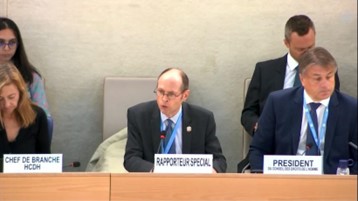
By Conall Corrigan / GICJ
Executive Summary
During the 17th and 18th meetings of the 53rd session of the Human Rights Council (HRC) Professor Olivier De Schutter, the Special Rapporteur on extreme poverty and human rights, appealed to member states to treat discrimination against people in poverty no less seriously than racism, sexism, or homophobia.
In an interactive dialogue, the Special Rapporteur argued that to address expanding gaps in poverty and inequality member states should introduce a job guarantee scheme in which the state acts as an employer of last resort. He contended that such a programme would transform the right to work from a policy ambition into an enforceable legal right.
Professor De Schutter pointed to the success of such schemes in India and South Africa as an example of what states can achieve if they take a multifaceted approach to eradicating poverty. By addressing extreme levels of poverty, the Special Rapporteur also noted that the physical and mental health of the population will likely improve due to the availability of secure employment.
During the interactive dialogue, states broadly supported the recommendations offered in the Special Rapporteur’s report and highlighted the efforts they have already taken to achieve Sustainable Development Goal (SDG) No. 1 to “end poverty in all its forms everywhere”.
Geneva International Centre for Justice (GICJ) commends the Special Rapporteur on extreme poverty and human rights for his efforts to combat growing global inequality and poverty. In order to fulfil the right to work, states must make every effort to address rapidly increasing poverty rates, particularly in the context of the current cost-of-living crisis.
Background
Professor Olivier De Schutter was appointed as the UN Special Rapporteur on extreme poverty and human rights by the HRC at its 43rd session in March 2020. During the 47th session of the HRC Professor De Schutter emphasised the need for a Global Fund for Social Protection. It would be created to increase the level of support to low-income countries, thus helping them to both establish and maintain social protection floors in the form of legal entitlements and to improve the resilience of social protection systems against shocks.
In doing so Professor De Schutter referenced provisions within the International Covenant on Economic, Social and Cultural Rights (ICESCR) and the Social Protection Floors Recommendation, 2012 (No. 202) of the International Labour Organisation, as well as targets 1.3 and 3.8 of the Sustainable Development Goals, which require that all individuals are protected from extreme destitution by being provided with income security when they cannot obtain an income sufficient to lead a decent life as waged or self-employed workers.
In a report submitted to the 53rd session of the HRC, the Special Rapporteur explained how the introduction of a job guarantee, with the State acting as an employer of last resort, can contribute to the full realisation of the right to work with an emphasis on ensuring that vulnerable groups are granted equal access to the labour market.
Summary of the Report of the Special Rapporteur on Extreme Poverty and Human Rights
The Special Rapporteur began his update by noting that since last year’s interactive dialogue, he has presented a report to the General Assembly on the prohibition of discrimination on the grounds of poverty. In this report, he aimed to highlight the lived experiences of people in poverty who face abuse and discrimination in their daily lives due to their socioeconomic status. He appealed to states to take urgent action to address discrimination towards those in poverty and reiterated his support for increased solidarity towards low-income countries in support of the establishment of social protection funds in line with his June 2021 report presented before HRC on global funds for social protection. Although the need to increase financial support to developing countries seeking to establish social protection funds is broadly recognised, the Special Rapporteur stressed the need for the HRC to support these efforts to ensure they build on the resolution adopted in June 2021 by the International Labour Conference (ILO) and the Our Common Agenda report presented in Sep 2021 which refer to the need to establish said funds.
 Professor De Schutter placed the global economic situation in context by noting that the cost-of-living crisis has continued to rise, making recovery from the COVID-19 pandemic and economic crisis very difficult for low-income households. The prices of basic goods which have increased the most, namely food and energy, are also the items that represent the largest part of the budgets of these low-income households. Many households are in debt, and the reaction of central banks to inflation is to raise interest rates, which will likely worsen the situation of these heavily indebted households. The Special Rapporteur added that as a result of the rise in interest rates, companies will invest less and layoffs may follow. He noted that the current context is one in which poverty is rapidly increasing, leading to widening inequalities despite the apparent job recovery since the pandemic. While the ILO expects global unemployment to drop below pre-pandemic levels in 2023 to 191 million, or 5.3% of the population, this recovery is not shared across all regions. Unemployment is projected to be 11% in North Africa with a similar picture in Arab and sub-Saharan African countries. In other regions, while unemployment is falling, this is not a reason to ignore ongoing problems. Moreover, official unemployment figures do not account for countless people who disappear from unemployment statistics because of circumstances outside of their control, including lack of childcare. According to the Special Rapporteur’s report, by 2035 an additional 470 million people will be looking for work in developing countries with the greening of the economy and the growing care economy requiring substantial workforces. Moreover, the ILO has asserted that the capacity needed to fill the health, education, and care economy to meet the SDGs in some 45 countries will require 170 million additional jobs. The Special Rapporteur added that many of the areas of the economy are understaffed because they are not the source of massive profits yet are of huge value to society. Considering this, Professor De Schutter stressed that it is imperative that states use all the tools available to them to combat poverty and strengthen resilience against the economic shocks felt by households and countries. Against such a background, the Special Rapporteur decided to focus his thematic report to the HRC on the idea of a job guarantee.
Professor De Schutter placed the global economic situation in context by noting that the cost-of-living crisis has continued to rise, making recovery from the COVID-19 pandemic and economic crisis very difficult for low-income households. The prices of basic goods which have increased the most, namely food and energy, are also the items that represent the largest part of the budgets of these low-income households. Many households are in debt, and the reaction of central banks to inflation is to raise interest rates, which will likely worsen the situation of these heavily indebted households. The Special Rapporteur added that as a result of the rise in interest rates, companies will invest less and layoffs may follow. He noted that the current context is one in which poverty is rapidly increasing, leading to widening inequalities despite the apparent job recovery since the pandemic. While the ILO expects global unemployment to drop below pre-pandemic levels in 2023 to 191 million, or 5.3% of the population, this recovery is not shared across all regions. Unemployment is projected to be 11% in North Africa with a similar picture in Arab and sub-Saharan African countries. In other regions, while unemployment is falling, this is not a reason to ignore ongoing problems. Moreover, official unemployment figures do not account for countless people who disappear from unemployment statistics because of circumstances outside of their control, including lack of childcare. According to the Special Rapporteur’s report, by 2035 an additional 470 million people will be looking for work in developing countries with the greening of the economy and the growing care economy requiring substantial workforces. Moreover, the ILO has asserted that the capacity needed to fill the health, education, and care economy to meet the SDGs in some 45 countries will require 170 million additional jobs. The Special Rapporteur added that many of the areas of the economy are understaffed because they are not the source of massive profits yet are of huge value to society. Considering this, Professor De Schutter stressed that it is imperative that states use all the tools available to them to combat poverty and strengthen resilience against the economic shocks felt by households and countries. Against such a background, the Special Rapporteur decided to focus his thematic report to the HRC on the idea of a job guarantee.
Throughout his report, the Special Rapporteur encouraged all actors including governments and human rights mechanisms to take the right to work seriously as a fundamental human right. The ICESCR and ILO Employment Policy Convention of 1964 recognise the right to work but do so by imposing little more than an obligation on governments to do what they can to create jobs. Professor De Schutter stated that Article 6 of the ICESCR refers to the duties of governments to take steps to achieve full and productive employment while the ILO Convention 122 adopts an active policy designed to promote full, productive and freely chosen employment. The report argued that these Conventions can form the basis for a legally enforceable right to work which would guarantee a right to paid public employment to any adult able and willing to work.
The Special Rapporteur informed the Council that presently the most successful large-scale job guarantee programmes are being led by countries in the global south. The largest, the Mahatma Gandhi National Rural Employment Guarantee Act, in India directly benefited 76 million households in 2020-21, while in South Africa the Expanded Public Works Programme created 1 million job opportunities in 2021-22. Meanwhile, smaller schemes are up and running in the global north in France, while other pilot programmes are running in Austria and Belgium. The report also discusses the social implications of long-term and structural unemployment and notes that unemployed people are nearly twice as likely to report experiencing physiological problems as those who are in employment. Professor De Schutter reiterated that joblessness causes distress and the job guarantee can help to address this and what he termed the “global employment paradox” that sees persistent unemployment and underemployment coexisting with unsatisfied social needs.
The Special Rapporteur concluded the summary of his report by claiming that in the future, he intends to put more emphasis on the follow-ups to recommendations identified during his country visits. He added that he believes there are strong arguments in favour of the idea of introducing a job guarantee scheme and hopes the report can be utilised as part of a toolbox for states to tackle poverty.
Interactive Dialogue
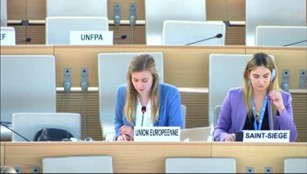 The European Union reasserted their support for the mandate of the Special Rapporteur and the Agenda 2030 including the SDG number concerning the eradication of poverty in all its forms. The delegate highlighted that policies for a guaranteed employment scheme play a role in fighting poverty and social exclusion by emphasising the creation of more jobs and the greater inclusion of the most vulnerable into the labour market. The representative added that all EU countries have committed to implementing the European guarantee for youth which aims to provide every young person under 30 with a lasting solution for employment. Since 2013, approximately 24 million young Europeans have benefited from this framework's support. The EU also underscored the disproportionate impact poverty has on women's employment opportunities worldwide.
The European Union reasserted their support for the mandate of the Special Rapporteur and the Agenda 2030 including the SDG number concerning the eradication of poverty in all its forms. The delegate highlighted that policies for a guaranteed employment scheme play a role in fighting poverty and social exclusion by emphasising the creation of more jobs and the greater inclusion of the most vulnerable into the labour market. The representative added that all EU countries have committed to implementing the European guarantee for youth which aims to provide every young person under 30 with a lasting solution for employment. Since 2013, approximately 24 million young Europeans have benefited from this framework's support. The EU also underscored the disproportionate impact poverty has on women's employment opportunities worldwide.
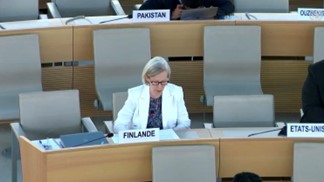 On behalf of the Nordic and Baltic Countries, Finland noted that unemployment can have far-reaching effects on individuals and society as a whole and highlighted existing inequalities within the labour market. The representative added that full and productive employment for all can contribute to the realisation of human rights including the right to work by reducing poverty and discrimination. To tackle this issue, Finland called on HRC member states to better integrate people in vulnerable situations, including persons with disabilities, into the labour market and ensure social protections for those who are excluded from it. She added that innovative solutions are needed to tackle poverty globally as is also ensuring that the greening of the economy is fair and inclusive.
On behalf of the Nordic and Baltic Countries, Finland noted that unemployment can have far-reaching effects on individuals and society as a whole and highlighted existing inequalities within the labour market. The representative added that full and productive employment for all can contribute to the realisation of human rights including the right to work by reducing poverty and discrimination. To tackle this issue, Finland called on HRC member states to better integrate people in vulnerable situations, including persons with disabilities, into the labour market and ensure social protections for those who are excluded from it. She added that innovative solutions are needed to tackle poverty globally as is also ensuring that the greening of the economy is fair and inclusive.
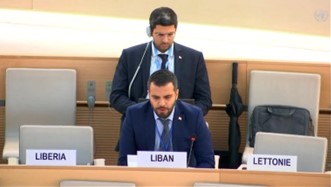 Lebanon on behalf of the Arab Group noted that most middle-income Arab countries have witnessed an increase in poverty rates in the last decade. However, multiple conflicts, drought, climate change and covid ramifications have exacerbated poverty rates, food insecurity, inequalities, unemployment, and reduced wages. All of this has caused huge setbacks in many Arab countries as it has impacted people’s capacity to consume and receive basic services causing many to face the risk of falling into poverty. The delegate asserted the commitment of Arab countries to achieving the SDGs by 2030, namely goal number 1. To realise this goal, Lebanon has adopted the Arab Strategic Framework to eradicate poverty in its multidimensional forms between 2020-2030 with a focus on helping the most vulnerable groups, namely persons with disabilities, the elderly, and children, and empowering young people and women.
Lebanon on behalf of the Arab Group noted that most middle-income Arab countries have witnessed an increase in poverty rates in the last decade. However, multiple conflicts, drought, climate change and covid ramifications have exacerbated poverty rates, food insecurity, inequalities, unemployment, and reduced wages. All of this has caused huge setbacks in many Arab countries as it has impacted people’s capacity to consume and receive basic services causing many to face the risk of falling into poverty. The delegate asserted the commitment of Arab countries to achieving the SDGs by 2030, namely goal number 1. To realise this goal, Lebanon has adopted the Arab Strategic Framework to eradicate poverty in its multidimensional forms between 2020-2030 with a focus on helping the most vulnerable groups, namely persons with disabilities, the elderly, and children, and empowering young people and women.
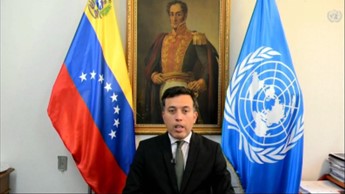 Venezuela on behalf of the Group of Friends in Defence of the Charter of the UN, informed the Council that today more than 700 million people are living in extreme poverty while more than 820 million are affected by hunger worldwide. The delegate added that any illegal application of unilateral coercive measures which are aimed at targeting civilian populations not only represents a deliberate attack against the right to development but they also create and aggravate the conditions for poverty and inequality in targeted countries. He stressed that the eradication of poverty in all its forms and dimensions and putting an end to hunger worldwide have long been a top priority for the international community. The group reaffirmed that the 2030 Agenda continues to be their internationally agreed roadmap, not only for creating a more peaceful and inclusive society but also for overcoming, through collective action, the common challenges faced towards the realisation of the inalienable right to development.
Venezuela on behalf of the Group of Friends in Defence of the Charter of the UN, informed the Council that today more than 700 million people are living in extreme poverty while more than 820 million are affected by hunger worldwide. The delegate added that any illegal application of unilateral coercive measures which are aimed at targeting civilian populations not only represents a deliberate attack against the right to development but they also create and aggravate the conditions for poverty and inequality in targeted countries. He stressed that the eradication of poverty in all its forms and dimensions and putting an end to hunger worldwide have long been a top priority for the international community. The group reaffirmed that the 2030 Agenda continues to be their internationally agreed roadmap, not only for creating a more peaceful and inclusive society but also for overcoming, through collective action, the common challenges faced towards the realisation of the inalienable right to development.
The Special Rapporteur expressed his gratitude to states for detailing their experiences of establishing job guarantees and the work they have undertaken to promote the right to work and fight poverty. Regarding questions posed on how a job guarantee can empower women and promote equality of treatment, Professor De Schutter explained that this can be achieved in three ways. Firstly, he highlighted that projects supported by job guarantees can alleviate the burden that many women face when they are left to take care of children and older persons or when they must fetch water. He claimed that many job guarantee projects can address precisely those needs and reduce poverty among women. Secondly, he asserted that many of these schemes have provisions that support women’s access to such programmes. For example, the Mahatma Gandhi programme has a 1/3 reservation quota for women and has provided many with the opportunity to have waged employment for the first time. Thirdly, he added that these programmes can combat gender stereotypes and challenge perceived notions about the division of labour between women and men by training women in construction work and by training men in care work.
Moreover, in relation to questions around the potential for job guarantees to empower recipients, the Special Rapporteur noted that they can facilitate the transition from informal to formal work because informal workers can better insist on their work being declared and formalised if they have the fallback option of a public job which they will have access to if their working conditions are not improved. If the incomes of families improve thanks to the jobs programme parents will then have less of a need to put their children to work and can more easily finance their education.
Additionally, concerning questions around the issue of financing the Special Rapporteur noted that unemployment and long-term structural unemployment has enormous costs to the population because of the impact on social cohesion and public health, particularly around levels of anxiety and depression. He added that this can have important multiplier effects on the economy. He argued that the job guarantee can help to provide public goods, much-needed investments and provide skills training to participants which will improve their job prospects once they graduate from the programme. He concluded by noting that the cost of unemployment is huge both monetarily and non-monetarily.
NGOs and National Human Rights Institutions
Many NGOs supported the contents of the report which highlights the importance of job guarantee programmes in reducing poverty and how such programmes can create jobs in areas in urgent social need which remain undersupplied by the market. Moreover, many stressed that such programmes can encourage meaningful participation in the economy by rights-holders, particularly the most socially marginalised groups. However, NGOs emphasised the need for such programmes to reach those who need them the most and ensure that they are sustainable. Some also noted that it is important for job programmes to be developed at the local level in keeping with local conditions and needs and to allow for decentralised planning processes. Groups stressed the importance of such programmes providing access to decent work as defined by the ILO and providing a dignified life to their participants and instilling social justice. Several speakers related poverty to the rising issue of homelessness and believed that the report highlights the significant impact of job guarantees in elevating people out of this situation and promoting social inclusion.
Concluding Remarks
The Special Rapporteur concluded the meeting by explaining that the job guarantee programme is based on three basic convictions:
- No one is unemployable
- There are many unmet yet urgent societal needs. Although there is a shortage of jobs there is no shortage of work to be done
- The job guarantee is affordable if states consider the huge costs of unemployment to both the individual and society
He added that placing the jobs programme in a human rights framework will hopefully allow states to interpret Article 6 of the ICESCR in that light and make governments do even more to guarantee the right to work. Moreover, it may also allow states to interpret the 1964 ILO Convention in that light and make it possible to apply a human rights framework to job programmes so that no one is discriminated against in terms of access. Professor De Schutter stated that the most difficult-to-reach will be reached first and the need to reinforce accountability and participation in the design, implementation, and evaluation of these programmes.
Position of Geneva International Centre for Justice
Geneva International Centre for Justice (GICJ) commends the Special Rapporteur on extreme poverty and human rights for reinforcing the need to adopt large-scale solutions such as the job guarantee programme to eradicate global poverty. Poverty is a denial of fundamental human rights and should be regarded as such by the international community. Due to the multifaceted impact poverty can have on populations including lower levels of educational attainment and poorer physical and mental development, states must formulate policies to effectively address the root cause of poverty and guarantee vulnerable groups can access the labour market on par with the rest of society.
Recent examples of such programmes including the Mahatma Gandhi National Rural Employment Guarantee Act in India and the Expanded Public Works Programme in South Africa have effectively demonstrated the value such initiatives can have on tackling long-term unemployment. Poverty eradication is the foundation for the development of human rights and programmes such as the employment guarantee can make it possible for fundamental rights such as the right to work to become a fully realised and enforceable right rather than a policy objective.
HRC53, Extreme Poverty, Inequality, Geneva4justice, GICJ, Geneva International Centre for Justice, Human Rights Council







